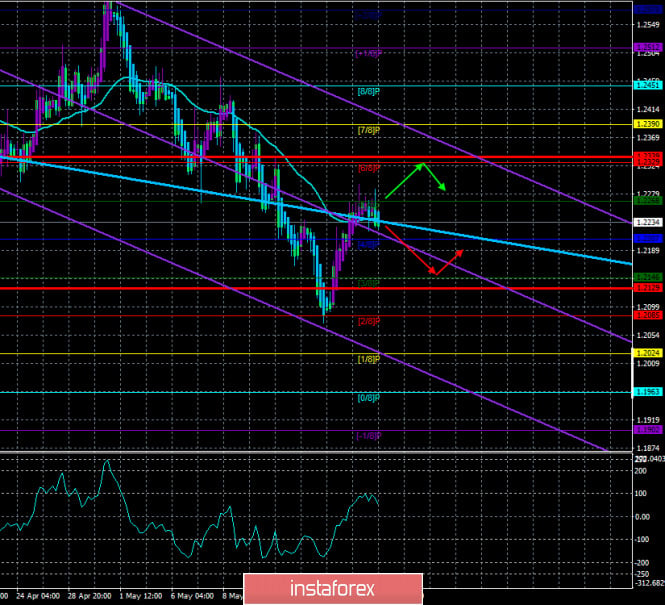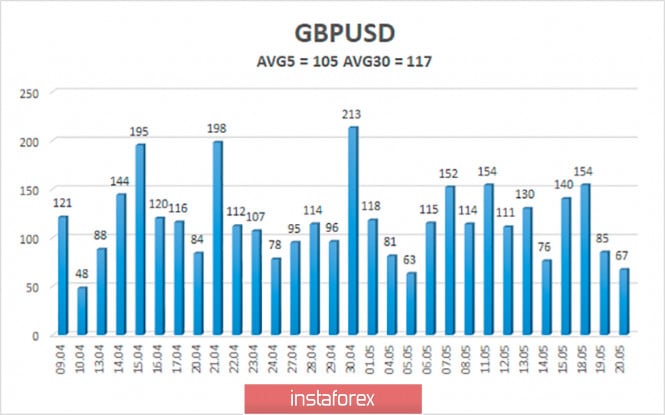4-hour timeframe

Technical details:
Higher linear regression channel: direction - downward.
Lower linear regression channel: direction - downward.
Moving average (20; smoothed) - sideways.
CCI: 83.1255
The British pound spent the third trading day of the week in a very narrow price range and began to move down by the end of the trading day, despite the previous consolidation above the moving average line. In general, we can say that by the end of Wednesday, the pound failed to continue its upward movement, which increases the chances of resuming the downward trend. Market participants ignored the macroeconomic report on inflation, as well as many previous ones. The head of the Bank of England, Andrew Bailey, did not say anything new in principle at his speech. The only thing that the media is reporting now is that the Board of the British regulator is still considering the possibility of further expanding the quantitative stimulus program, as well as the possibility of reducing the key rate to a negative area. It is reported that BA is now studying the experience of other countries that already have negative rates.
However, all this information does not significantly change the already established fundamental background. And it remains extremely negative for the British currency. Even if everyday traders do not get information feed that would allow them to sell the pound again and again, nevertheless, the "Sword of Damocles" has been hanging over the British currency for the past 3-4 years. With the emergence and arrival of the "coronavirus" epidemic in the Foggy Albion, all the problems of Great Britain only increased. However, Boris Johnson is not discouraged, and the country is preparing to terminate all agreements with the EU after December 31. Today, the UK government announced that up to 60% of goods entering the UK will not be subject to any tariffs or duties. The Ministry of Foreign Trade of the country has announced a new tariff regime, which will be much simpler and cheaper than the single external tariff of the European Union. It is also noted that it will be in pounds, not euros. "For the first time in 50 years, we can set our own tariff regime, which will be adapted to the UK economy. Our new tariff will benefit British consumers and households by removing various red tape and reducing the cost of thousands of goods," the Ministry of Foreign Trade said.
As we have repeatedly stated, there is almost no correlation between the euro and the pound. If the euro currency has grown in recent days by 250 points against the US currency but generally holds inside the side channel, then the pound has started a new downward trend against the US currency and is currently only being corrected. Thus, despite all the political upheavals in the United States, the eternal war (during the reign of Donald Trump) between the Democrats and Republicans, which, in particular, does not allow to approve a new package of assistance to the US economy for $ 3 trillion, despite the strong economic decline, strong unemployment and large-scale defeat by the "coronavirus", the American dollar still looks much more attractive to investors and traders than the British pound. Buyers of the pound can only hope that the government of Boris Johnson will still be able to agree with the European Union on trade terms and other aspects of a comprehensive agreement that will determine the relationship between Brussels and London after 2020. Or it is still hoping for an even greater deterioration of the situation in America. And this may well happen. We have already said that a new trade war between China and the United States will hit the entire world economy and the economy of the United States itself. So far, Donald Trump and the company have refrained from concrete actions, but there is some progress in this direction. However, it is foolish to assume that China plays a secondary role in this confrontation. We believe that China is very competent in its battles with Washington. First, Beijing does not get into trouble, does not provoke conflicts first, and only responds to the attacks of the United States. Secondly, after all, the Chinese economy is the largest in the world along with the American one, so there is something to respond to Beijing in any case. Accordingly, it is foolish to expect that the United States will impose new duties, apply sanctions to Chinese officials, Chinese companies, and at this time, Beijing will simply remain silent and wait for everything to end. Thus, any actions against China will primarily affect America itself. Consequently, its economy will be weakened even more, although it continues to decline at the moment, despite the weakening of the "lockdown".
On the penultimate trading day of the week in the UK, the publication of business activity indices in the services and manufacturing sectors is scheduled. As in the case of the European Union and Germany, both indices should grow by the end of May, in the service sector - to a value of 25, in the production sector - to a value of 36. However, we believe that this data will be ignored by market participants and will only allow us to understand whether the British economy is beginning to recover? In the United States, more interesting data will be published on Thursday. First, this is a report on applications for unemployment benefits. According to experts' forecasts, the number of initial applications in the week of May 15 will amount to another 2.4 million, so the total number of initial applications will reach 40 million in 10 weeks. But the number of secondary applications, which is considered a more accurate indicator of real unemployment, could reach 24.765 million for the week of May 8. However, in any case, we will see an increase in both indicators, which means that the situation with unemployment in the US will worsen. Also, data on business activity in the service sector (forecast – growth from 26.7 to 30.0), as well as in the manufacturing sector (forecast – growth from 36.1 to 38.0) will be received from overseas. As we can see, the situation is about the same as in Britain, the EU, and Germany. Late in the evening, there will be another speech by the head of the Fed, Jerome Powell, who has spoken or given interviews three times in the past 5 days. Thus, we do not expect any new information from him. Most likely, the Fed Chairman will again talk about a "strong economic shock" and the need for additional monetary injections into the US economy.

The average volatility of the GBP/USD pair remains stable and currently stands at 105 points. On Thursday, May 21, thus, we expect movement within the channel, limited by the levels of 1.2129 and 1.2339. The reversal of the Heiken Ashi indicator indicates a possible resumption of the downward trend. Fixing the price below the moving average will confirm this hypothesis.
Nearest support levels:
S1 – 1.2207
S2 – 1.2146
S3 – 1.2085
Nearest resistance levels:
R1 – 1.2268
R2 – 1.2329
R3 – 1.2390
Trading recommendations:
The GBP/USD pair turned down on the 4-hour timeframe, and fixing below the moving average will trigger a change in the downward trend. Thus, it is now recommended to trade the pound/dollar pair for a decrease with the goals of 1.2146 and 1.2129, but after fixing the price below the moving average line. It is recommended to buy the pound/dollar pair if traders manage to keep the pair above the moving average and after overcoming the Murray level of "5/8"-1.2268, with goals of 1.2329 and 1.2390.
The material has been provided by InstaForex Company - www.instaforex.com